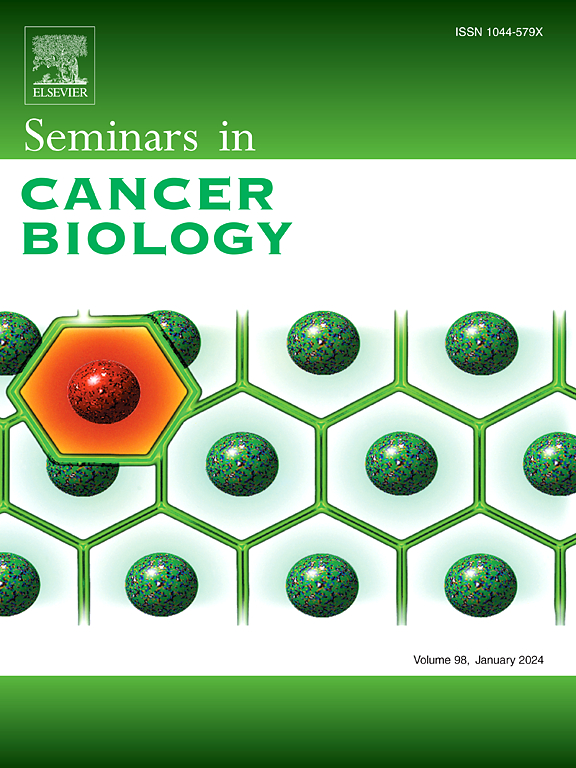癌症免疫疗法诱发心血管毒性的系统综述:潜在机制、临床表现和治疗方法。
IF 12.1
1区 医学
Q1 ONCOLOGY
引用次数: 0
摘要
免疫疗法彻底改变了各种癌症的治疗,甚至包括以前被认为无法治疗的癌症。然而,这些药物也与各种器官的炎症和损伤有关。癌症免疫疗法对心血管的不良影响就是这些挑战的例证,需要对其进行全面的了解、澄清和管理,并将其纳入癌症患者的整体护理中。许多抗癌免疫疗法都与心血管毒性的发生率和严重程度有关。这些挑战强调了开展基础研究和应用研究的重要性,以阐明疾病原因、发现预后指标、改进诊断方法并创造成功的疗法。尽管 T 细胞的重要性已得到公认,但在诱发抗原、识别 T 细胞的原因以及 T 细胞导致心脏细胞损伤的机制等方面仍存在知识空白。在这篇综述中,我们总结了免疫疗法诱发心血管毒性的分子机制、流行病学、诊断、病理生理学和相应的治疗方法,包括免疫检查点抑制剂(ICIs)、采纳性细胞疗法(ACT)和双特异性 T 细胞诱导剂(BiTEs)等。通过阐明这些方面,我们希望更好地了解癌症治疗中的免疫疗法,并为其临床应用提供指导。本文章由计算机程序翻译,如有差异,请以英文原文为准。
A systematic review of cardiovascular toxicities induced by cancer immune therapies: Underlying mechanisms, clinical manifestations and therapeutic approaches
Immunotherapy has revolutionized the management of various types of cancers, even those previously deemed untreatable. Nonetheless, these medications have been associated with inflammation and damage across various organs. These challenges are exemplified by the adverse cardiovascular impacts of cancer immunotherapy, which need comprehensive understanding, clarification, and management integrated into the overall care of cancer patients. Numerous anticancer immunotherapies have been linked to the prevalence and severity of cardiovascular toxicity. These challenges emphasize the importance of conducting fundamental and applied research to elucidate disease causes, discover prognostic indicators, enhance diagnostic methods, and create successful therapies. Despite the acknowledged importance of T cells, there remains a knowledge gap regarding the inciting antigens, the reasons for their recognition, and the mechanisms of how they contribute to cardiac cell injury. In this review, we summarize the molecular mechanism, epidemiology, diagnosis, pathophysiology and corresponding treatment of cardiovascular toxicity induced by immunotherapy, including immune checkpoint inhibitors (ICIs), adoptive cell therapies (ACT), and bi-specific T-cell engagers (BiTEs) among others. By elucidating these aspects, we aim to provide a better understanding of immunotherapies in cancer treatment and offer guidance for their clinical application.
求助全文
通过发布文献求助,成功后即可免费获取论文全文。
去求助
来源期刊

Seminars in cancer biology
医学-肿瘤学
CiteScore
26.80
自引率
4.10%
发文量
347
审稿时长
15.1 weeks
期刊介绍:
Seminars in Cancer Biology (YSCBI) is a specialized review journal that focuses on the field of molecular oncology. Its primary objective is to keep scientists up-to-date with the latest developments in this field.
The journal adopts a thematic approach, dedicating each issue to an important topic of interest to cancer biologists. These topics cover a range of research areas, including the underlying genetic and molecular causes of cellular transformation and cancer, as well as the molecular basis of potential therapies.
To ensure the highest quality and expertise, every issue is supervised by a guest editor or editors who are internationally recognized experts in the respective field. Each issue features approximately eight to twelve authoritative invited reviews that cover various aspects of the chosen subject area.
The ultimate goal of each issue of YSCBI is to offer a cohesive, easily comprehensible, and engaging overview of the selected topic. The journal strives to provide scientists with a coordinated and lively examination of the latest developments in the field of molecular oncology.
 求助内容:
求助内容: 应助结果提醒方式:
应助结果提醒方式:


